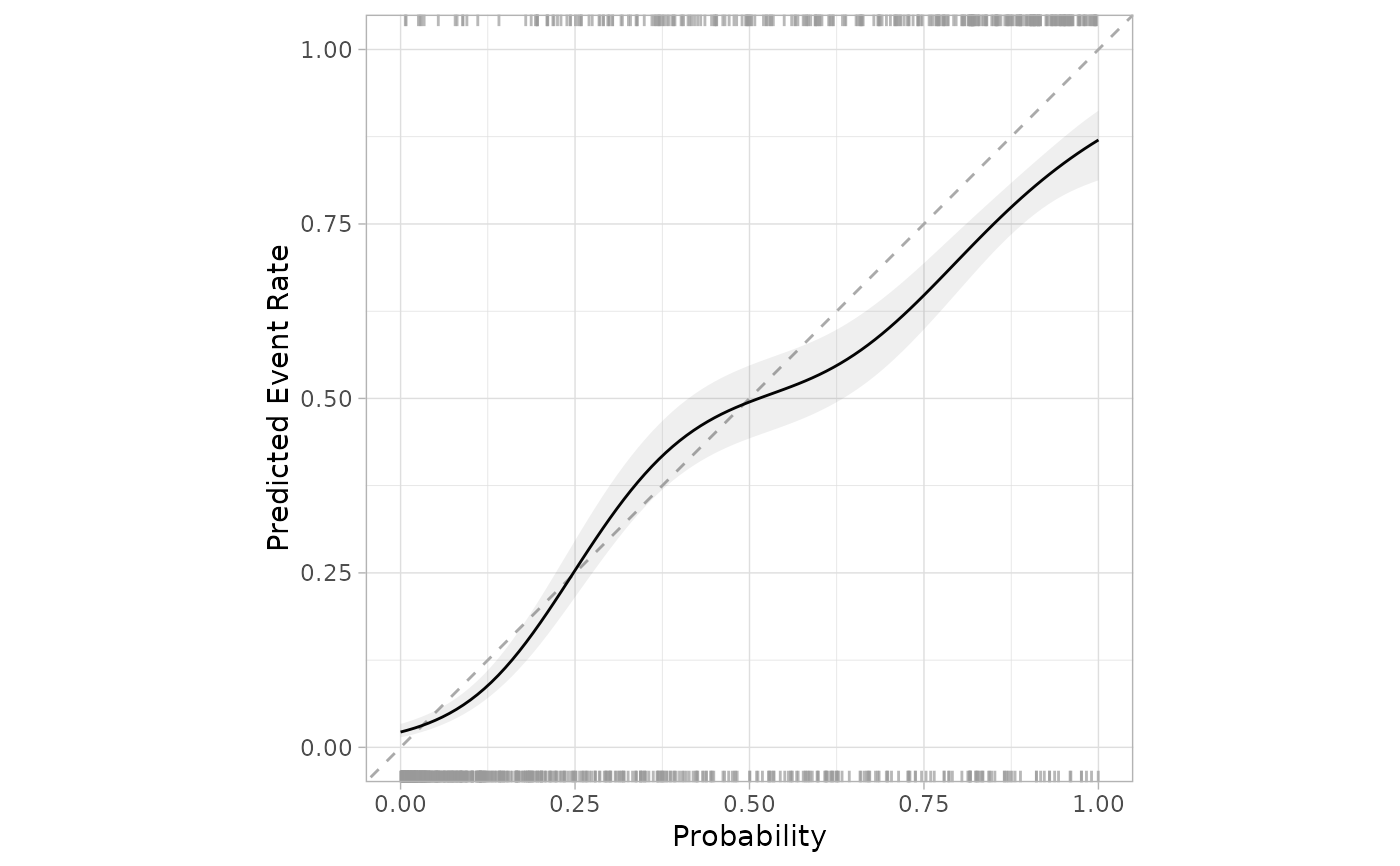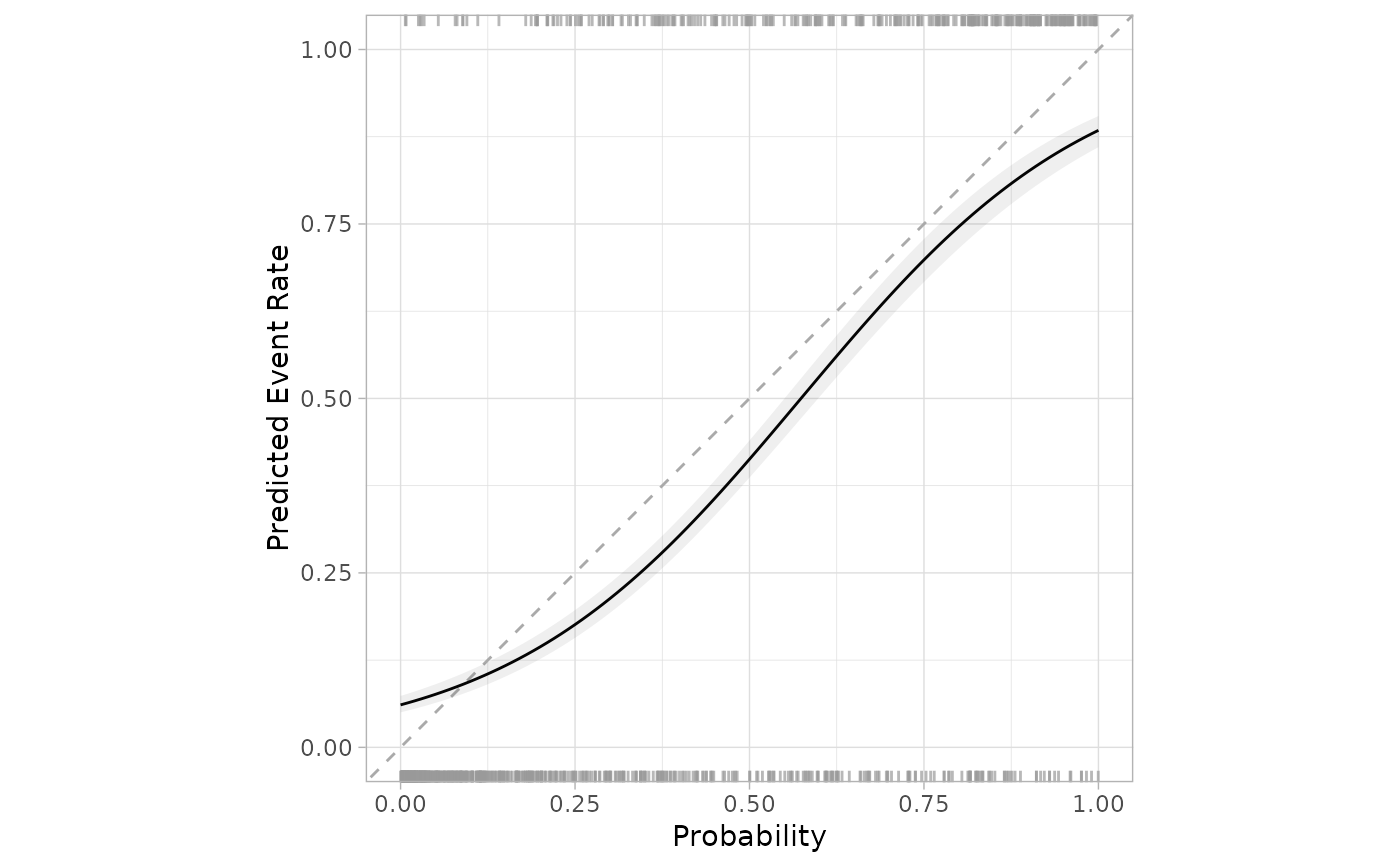
Probability calibration plots via logistic regression
Source:R/cal-plot-logistic.R
cal_plot_logistic.RdA logistic regression model is fit where the original outcome data are used
as the outcome and the estimated class probabilities for one class are used
as the predictor. If smooth = TRUE, a generalized additive model is fit
using mgcv::gam() and the default smoothing method. Otherwise, a simple
logistic regression is used.
If the predictions are well calibrated, the fitted curve should align with the diagonal line. Confidence intervals for the fitted line are also shown.
Usage
cal_plot_logistic(
.data,
truth = NULL,
estimate = dplyr::starts_with(".pred"),
conf_level = 0.9,
smooth = TRUE,
include_rug = TRUE,
include_ribbon = TRUE,
event_level = c("auto", "first", "second"),
...
)
# S3 method for class 'data.frame'
cal_plot_logistic(
.data,
truth = NULL,
estimate = dplyr::starts_with(".pred"),
conf_level = 0.9,
smooth = TRUE,
include_rug = TRUE,
include_ribbon = TRUE,
event_level = c("auto", "first", "second"),
...,
.by = NULL
)
# S3 method for class 'tune_results'
cal_plot_logistic(
.data,
truth = NULL,
estimate = dplyr::starts_with(".pred"),
conf_level = 0.9,
smooth = TRUE,
include_rug = TRUE,
include_ribbon = TRUE,
event_level = c("auto", "first", "second"),
...
)
# S3 method for class 'grouped_df'
cal_plot_logistic(
.data,
truth = NULL,
estimate = NULL,
conf_level = 0.9,
smooth = TRUE,
include_rug = TRUE,
include_ribbon = TRUE,
event_level = c("auto", "first", "second"),
...
)Arguments
- .data
An ungrouped data frame object containing predictions and probability columns.
- truth
The column identifier for the true class results (that is a factor). This should be an unquoted column name.
- estimate
A vector of column identifiers, or one of
dplyrselector functions to choose which variables contains the class probabilities. It defaults to the prefix used by tidymodels (.pred_). The order of the identifiers will be considered the same as the order of the levels of thetruthvariable.- conf_level
Confidence level to use in the visualization. It defaults to 0.9.
- smooth
A logical for using a generalized additive model with smooth terms for the predictor via
mgcv::gam()andmgcv::s().- include_rug
Flag that indicates if the Rug layer is to be included. It defaults to
TRUE. In the plot, the top side shows the frequency the event occurring, and the bottom the frequency of the event not occurring.- include_ribbon
Flag that indicates if the ribbon layer is to be included. It defaults to
TRUE.- event_level
single string. Either "first" or "second" to specify which level of truth to consider as the "event". Defaults to "auto", which allows the function decide which one to use based on the type of model (binary, multi-class or linear)
- ...
Additional arguments passed to the
tune_resultsobject.- .by
The column identifier for the grouping variable. This should be a single unquoted column name that selects a qualitative variable for grouping. Default to
NULL. When.by = NULLno grouping will take place.

